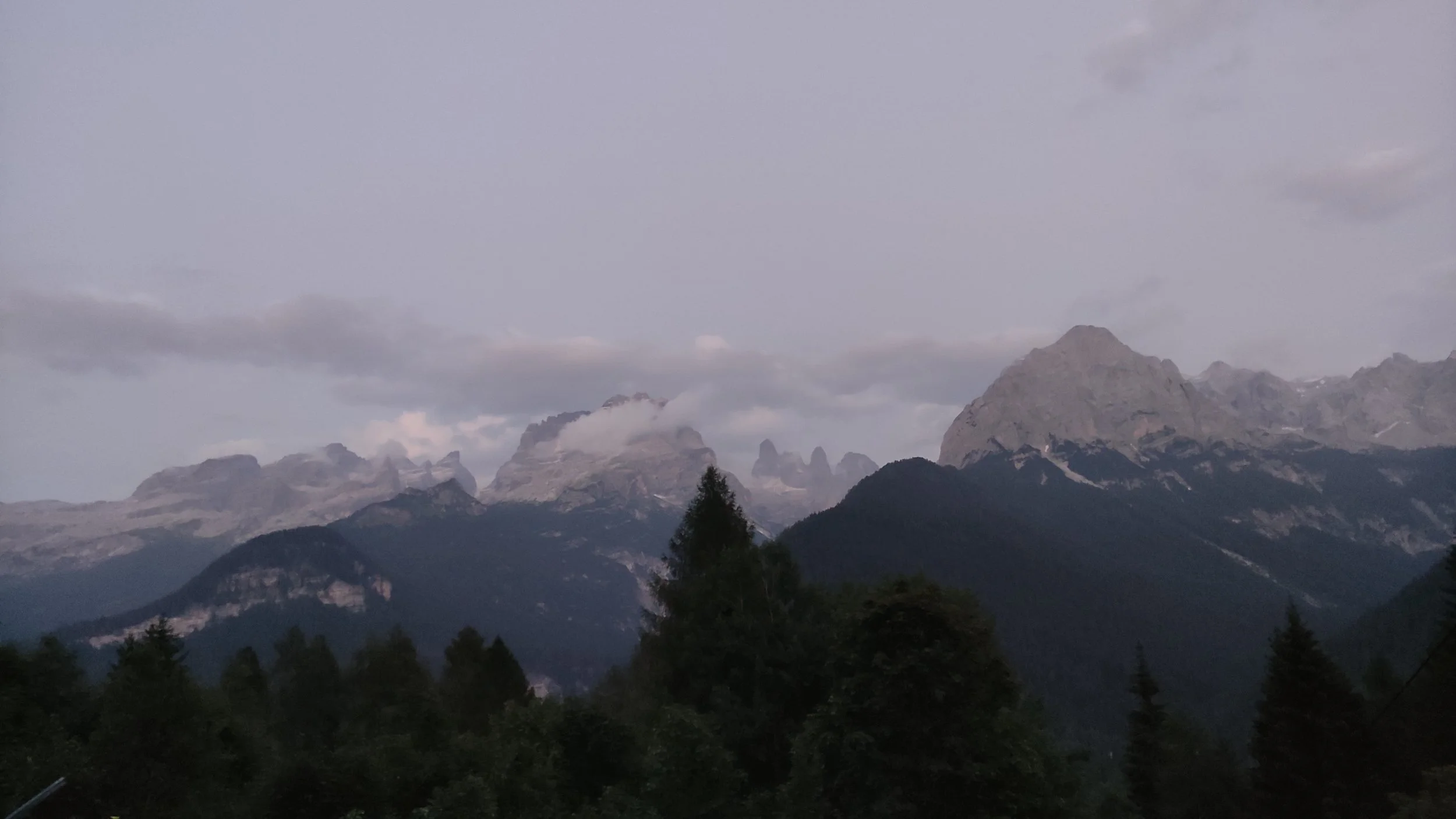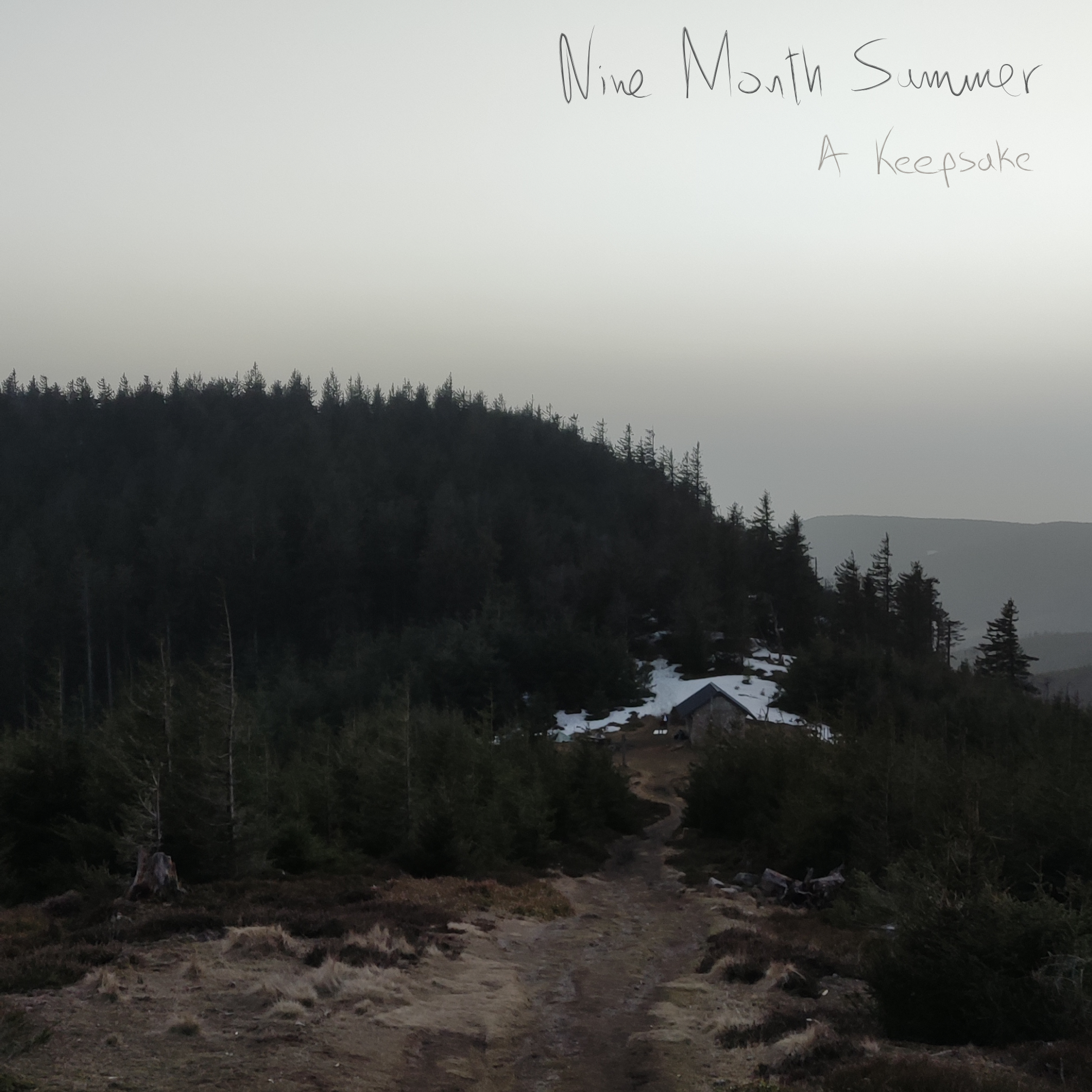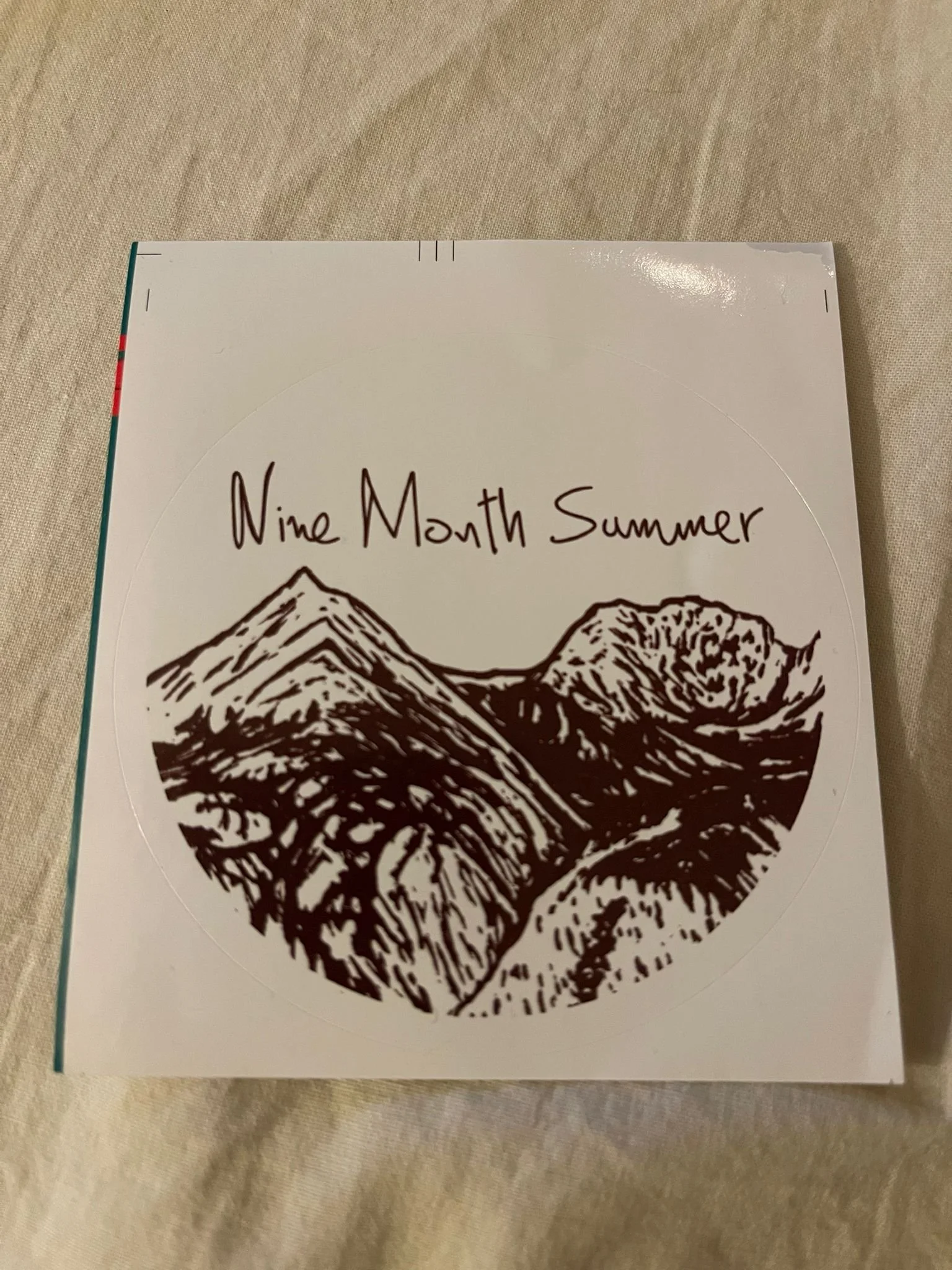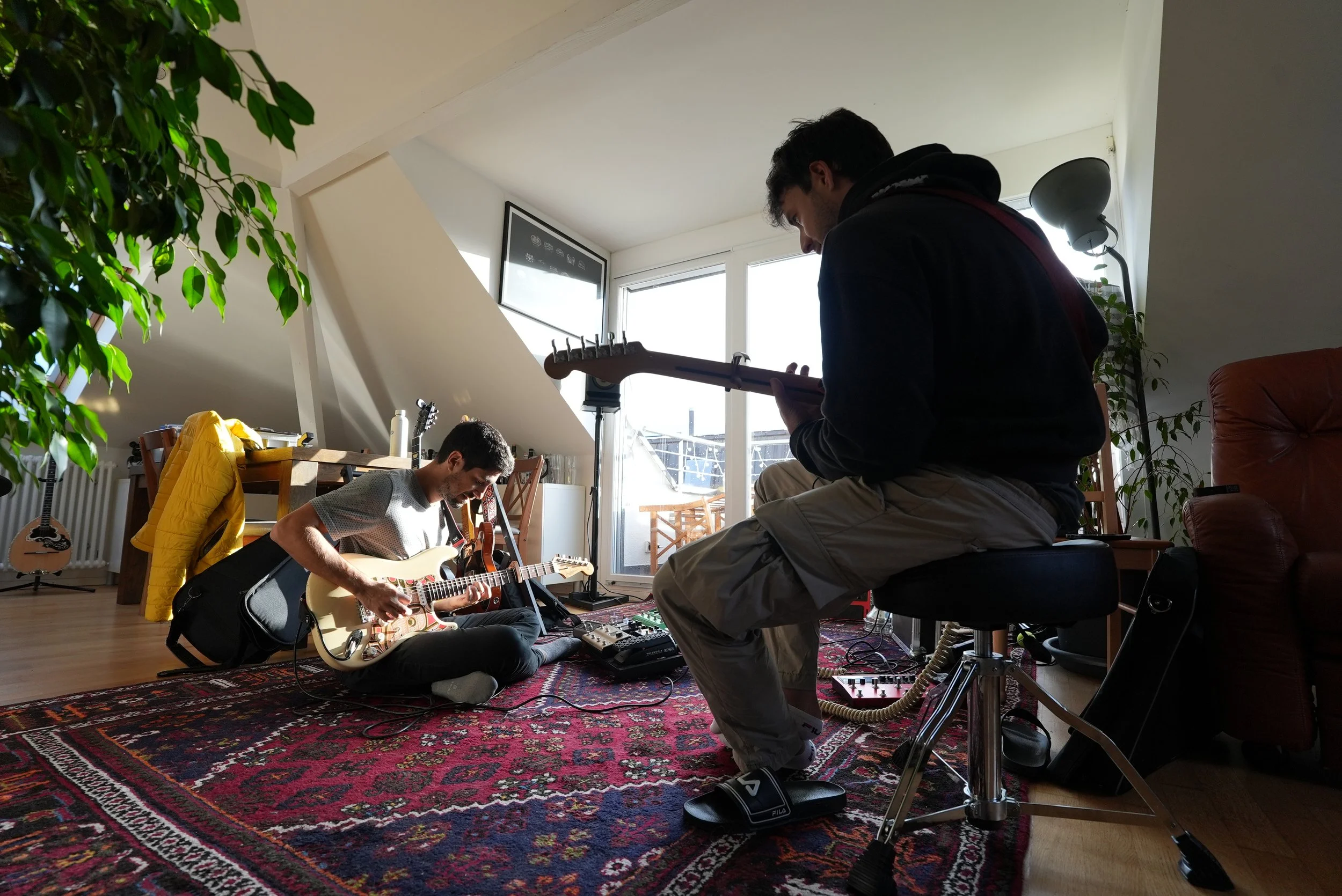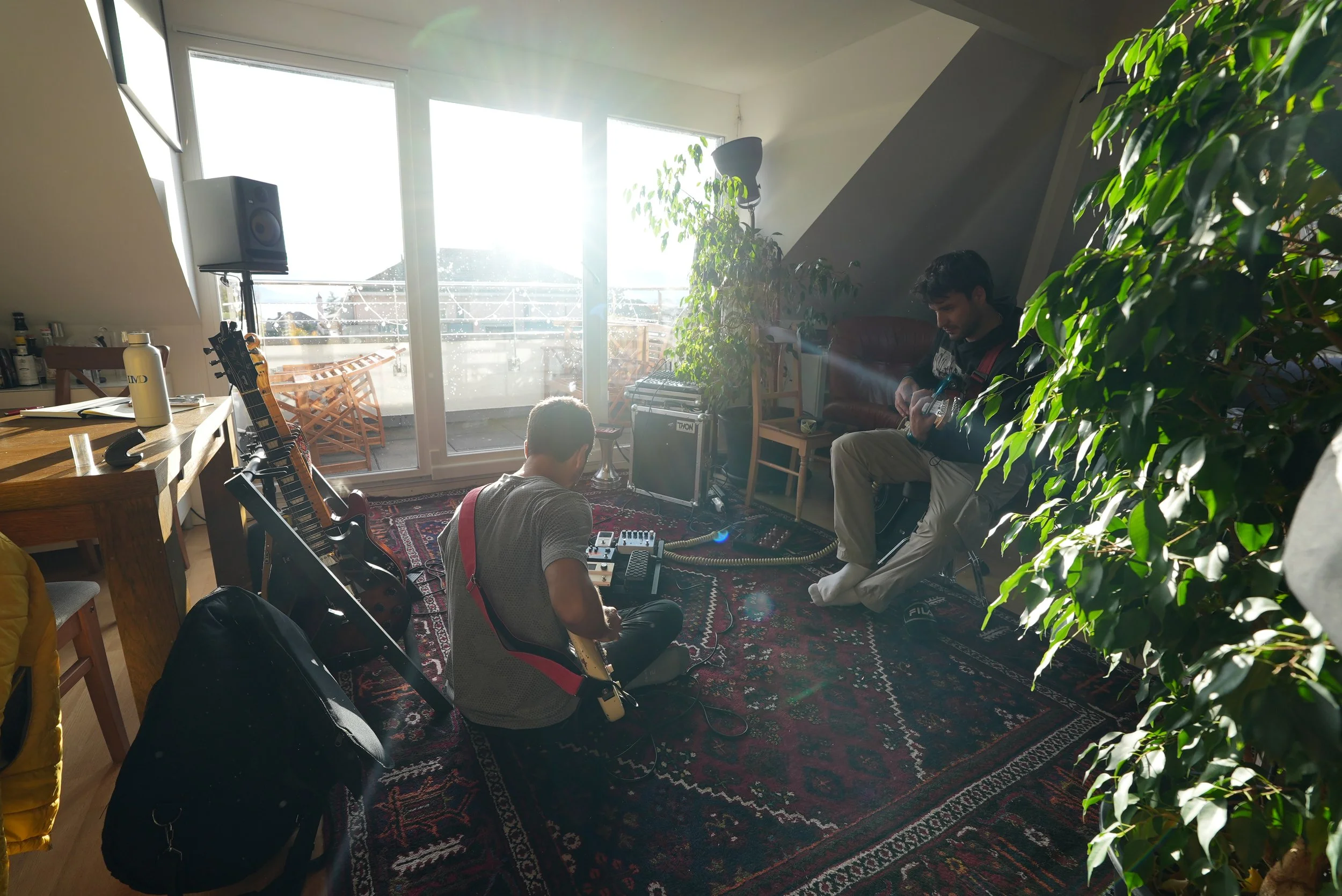Interview with Nine Month Summer
Towards the end of June, I came across an exciting new, instrumental project, Nine Month Summer, which mixes post-rock, math rock and Midwest emo. Even though I’m less-versed in Midwest emo, I’ve played around with the more typical tunings from the genre on guitar and was quickly intrigued by the resulting sounds. The debut album, which was released earlier this year, A Keepsake, is a wonderful album, and I’m really impressed by the compositions throughout the record. It would be easy to think that the songs were written by a band of four or five members but Nine Month Summer is the solo project of Petros Liakopoulos, who moved to Lausanne towards the end of 2021.
After having listened to the album a few times and getting in contact, we met up in Zurich to make some music, discuss his project and the music scene in Switzerland. Reverb Dream has not only allowed me to discover a lot of excellent music but it has also allowed me to meet a lot of fantastic and kind people across the country. Petros and myself aimed to do a live interview but circumstances prevented us from meeting at the Coilguns and Dear Misses concerts, so we decided to do the interview by email. In this interview, we will find out more about the history of Nine Month Summer, his song-writing approach, the recording of A Keepsake and the future of the project, especially now that he is in the process of putting together a live band.
I would like to thank Petros for his replies to my questions!
Introduction
Tell us about yourself:
My name is Petros Liakopoulos. As my last name suggests, I am Greek, born and raised in Athens. I have lived in many different places, including the Netherlands, France, and now Lausanne, a city I absolutely love living in. I am a research scientist by day, working on skin cancer, but I spend many of my evenings playing music, beach volleyball, or hiking around the Alps.
Tell us a bit about your musical background:
I started playing classical guitar when I was around 10 or so, and that transitioned into electric guitar as I grew older. Guitar very much remains my main instrument. I also play bass and a bit of drumming. I’ve been learning some piano recently, but that still needs plenty of work. Other than my high-school band, I had a project with two friends of mine when I was living in the Netherlands called Bowling Alone. We only had time to release one small EP together (which should be somewhere on SoundCloud) before I moved away. In fact, we only recorded three songs, and I had initially written and recorded When the Summer Ends (which also appears on my latest album A Keepsake) in my basement in Athens and released it as a fourth instrumental track on that EP.
Where did the idea to create Nine Month Summer come from?
Music has always been part of my life, and I would spend hours playing around with my looper and writing riffs. Unfortunately, as I bounced from city to city, I never quite found the right people or circumstances to turn these ideas into complete projects.
After facing a difficult period in my personal life, I found myself channelling creativity and emotions into writing. This made me realize that I was perhaps ready to have a go at composing and releasing music by myself, which was something I had long felt intimidated by. And so, Nine Month Summer was born!
Where did the name come from?
Coming from Greece, there is a very strong nostalgia associated with the end of summer, as we all leave our seaside dreams behind to head back to our lives. On a more personal level, a lot of unfortunate things have happened to me around the end of summer, so it always had me wishing it could last a little bit longer. I remember listening to American Football’s The Summer Ends, or a line from Turnover’s Cutting My Fingers Off that says, “every dream I’ve ever had has been of a better view and a ten-month summer.” I thought this accurately reflected the nostalgia that seems to permeate my existence and music, but I also thought, “well, I do love snowy mountains, so let’s leave three months of winter in there too.” Nine Month Summer felt like a good way to reference my musical influences and my own desire to have just a few more of those insouciant moments before reality comes crashing down.
Did you always want to make instrumental music with the project at the beginning?
Yes. I find it unique and challenging to try to get your emotions across to the listener without the direct line of communication that vocals provide. Also, I don’t exactly have faith in my singing abilities, though I have been thinking of at least attempting to release a song or two with vocals. For now, instrumental it is.
What influences (musical and non-musical) do you have for Nine Month Summer?
Many. I obviously draw a lot from instrumental bands such as Saxon Shore, Sigur Rós, Explosions in the Sky, and an Athens hometown post-rock group called One Hour Before the Trip, all of which I grew up listening to. Other indie acts like DIIV or The Jezabels also influenced me a lot. I then veered into math rock, Midwest emo, and shoegaze, with bands like TTNG, American Football, Turnover, toe, Chon, Enemies, Clever Girl, just to name a few. I also listen to a lot of pop-punk/emo bands like The Story So Far and Knuckle Puck, or bands like Citizen, Movements, and Balance and Composure. I made a playlist of some of those musical influences on my Spotify if readers are interested.
Apart from musical influences, a lot of the inspiration for these songs came from personal experiences and places I’ve been that mean a lot to me. For example, I love the Alps and spending time there, and I really found shelter there in difficult times. I was also inspired by places from my childhood in Greece. I’ve always loved maps and trying to track down locations from images, so I added references in the CD version of my album and on my social media to let listeners discover some of the places that inspired the music.
A Keepsake
How did you compose the songs for the album? Do you have a specific way of songwriting, starting with a certain instrument or being in a certain environment?
The songs usually start around guitar, which is my main instrument. I spend quite a few hours looping ideas, coming up with riffs and melodies, and usually build up from there. Since I am quite the night owl, I tend to get a lot of inspiration late at night and let my emotions guide my riffs. Some melodies I construct in my head when I visit places that inspire me, or locations where I felt particular emotions, and then I eventually try to bring them to life when I go home.
You mentioned that you collected a lot of riffs over time, how do you bring them together?
Like I described above, throughout the years I’d write riffs inspired by different locations and parts of my life. I tend to tie riffs to particular memories and places I’ve been. I’d pile some of those up on my hard drive to revisit later. Some songs on the album were written by picking some of those riffs up, taking myself back to that place and time, and building the song from there, adding new riffs, new melodies, etc.
Do you make many changes (e.g., key and tempo)? Is it more trial and error?
The choice of tempo, key, and time signatures is very much trial and error. Since none of my songs so far have vocals, I’ve never needed to adjust keys to fit vocal ranges, for example. Due to some of my influences, I will sometimes naturally write riffs in slightly unorthodox time signatures, but I still try to keep things manageable so as not to throw the listener off. For example, Foreign Waters runs a 7/8 groove, briefly switches to a 4/4 section, then goes back into 7/8. These are not necessarily things I did purposefully, but rather creative accidents.
How would a song normally evolve?
As I mentioned previously, I start with riffs, chord progressions, and main melodies, then try to build a rhythm section that I imagine in my head going along with those melodies. I will often write the main guitars for the full song and then go around changing melodies left and right for weeks or even months after. For the rhythm section, I try to gradually match the dynamics around the melodies and riffs I write. I had tremendous help from my producer Joey Demers on the rhythm section, he is an incredible drummer and really managed to bring it to life.
How do you incorporate other instruments (bass, drums, brass)?
Bass and drums are usually added after I have settled on the main riffs and chord progressions on the guitar and piano side. With Joey, we iterated over the MIDI drums and the bass to nail down the dynamics in each part and make it match the energy, and eventually he recorded the live drums. The brass was usually added last. I sometimes had small guitar melodies or note ideas that I wanted in there, and a brilliant musician called Gabriel Bastos helped me get those recorded on saxophone and matched my vision for the songs.
When do you decide that a song is finished?
That is actually a very good question! It’s something I tend to struggle with since I have a lot of riff and melody ideas and, unlike other post-rockers, I’m not a huge fan of very long songs. So I end up having to make some hard decisions to keep songs at a reasonable length and not overly cluttered melodically. When I feel like I’ve hit the sweet spot, I just stop and leave the song aside for a few weeks to avoid overthinking it.
What was your mindset going into the recording of the album?
My only mindset was to let out all the inspiration I had gathered, no expectations, no pressure, just a tiny bit of stress since it was my first time trying to do this solo.
How ready were the songs when you started? Did you have to rework some?
Well, not very ready. I only had drafts of songs and an idea of how I wanted the record to sound. The songs were reworked, both rhythmically and melodically, as they were coming together during the recording process.
Tell us about the recording process. Where and how did you record A Keepsake?
Part of why I was able to perfect the songs as I recorded was that it was all done in my apartment. The line between writing and recording was kind of blurred, I did all of it as I went. In terms of equipment, nothing fancy, just my DI box, some good amp sims, guitar pedals, and some excellent work by Joey on the rhythm section, mixing, and mastering. I must admit, I almost prefer home recording over a full studio session. It makes the record feel much more personal and, sound-wise, I don’t feel like you sacrifice much.
What are your memories from recording the album?
My emotions were a bit of a roller coaster during the recording process, to be honest. I remember looking out from my balcony and into my room as I had just finished recording the last guitar part for the final song, and it hit me, I had somehow done this. That moment was one of the happiest I’d had in a while, it was almost a relief.
How was the album mastered?
The album was mastered by Joey. We went through quite a few iterations to get the dynamics and volume just right, but we did it!
How did it feel to finally have the record out?
It felt, and still feels, incredible, to be honest. It’s not something one does very often, so I’ve been cherishing the moment.
What do you think of the final result?
I am very happy with it. It is very close to how I imagined it in my head, which is quite hard to achieve. I cannot wait to start performing it live!
How has the feedback been so far for the album?
I have received very good feedback so far. I’ve had the privilege of listeners reaching out from all over the world to thank me and tell me how much they liked the music. It is an amazing feeling to know that songs I wrote in my room have connected with people and brought people together.
Tell us about the merchandise you have for the album.
I have a CD version of the album which I released back in June. The artwork on the CD is all from photos I took of places that inspired the music. I also put out a T-shirt with a sketch of a beautiful mountain in the Italian Dolomites, which I had the privilege of visiting and where I formed some beautiful memories. It is the place that inspired Above The Clouds, and I thought it perfectly captured the vibe of the album.
Future
You’ve put together a band to perform the songs live, who is in the band?
Yes, I have. I am fortunate to be surrounded by good friends who will help me perform starting next year. My very close friend Martim Lisboa will be playing bass and saxophone, I have my high-school friend Kimon Karapetsis and his brother Manou Karapetsis on guitar, and Ainesh Das on drums.
How were the first rehearsals?
The vibe has been impeccable so far, we’re really getting along and are ready to perform. We are now starting to seek out venues to perform in for the upcoming spring/summer, so if you like the music, please email me to book us.
How does it feel to bring the songs to life?
Incredible, even in rehearsals. Especially since I recorded the songs solo, watching them come to life is so much fun. We are all very much looking forward to performing them.
Have the songs also evolved, or are they still similar to the recordings?
I wrote these songs with live performances in mind in terms of instrumentation and the number of people I would need on stage. Overall, I think the result sounds similar enough to the recordings while also having an extra edge to motivate people to come see us live.
Have new song ideas come out from the sessions? How do you see the next songs being written, more solo or as a collective?
Yes, we have been drawing inspiration from each other while playing. Martim, Kimon, and I have started working on some new stuff, in fact. It’s always refreshing to draw inspiration from other people, and I think it could really give a fresh perspective to the music. Although this started as a solo project, it is very much evolving into a group project, which is something I am very stoked about!
What else can we expect from Nine Month Summer in the future?
Now that we are complete as a band and have rehearsed, the focus is on playing shows to enjoy our time together and tighten our sound as a band. And more music, of course! Lots of music!
How has your experience in the Swiss music scene been so far?
I am still very new to the scene, but I am absolutely loving it so far. Switzerland has an incredible scene that I am only now beginning to dip my toes in. In Lausanne alone, I was lucky enough to discover many bands like Colmaar, Orso, Kalkas, just to name a few, hang out with Maxime Sachetto from Table Basse Records, who has been doing an incredible job for the scene here, and others. Bands like Umoora and Darius have really made me appreciate the quality of the Swiss post-rock scene.
Also, shout-out to my good friend Silvio Costa from the band Desert Lily, who has been helping me navigate the Swiss scene as an independent artist. And, of course, thank you, Marc, for this opportunity and for having this blog, it has been a tremendous source of information for discovering new artists. Your project is of incredible value to the community as a whole, and thank you for that!
Thank you for your support!
You will find all the music and merch in the links below.
We would love to come and play in your city, so if you want to book us, email us here: ninemonthsummermusic@gmail.com
Links:
Related articles:



